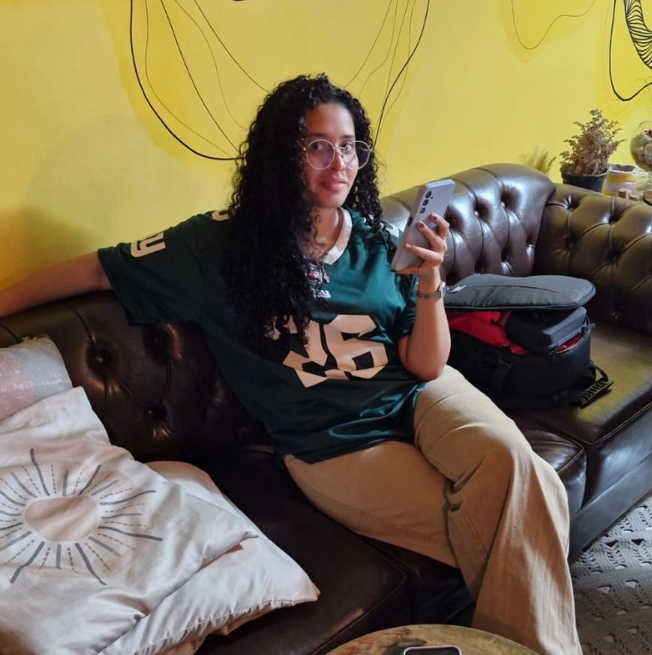Débora Almeida actress
The green eyes of neurosis
- by josé expedito marques -
DISCOVER
The Green Eyes of Neurosis
by josé expedito marques
A woman... A chair...
A silent scream!
In this intimate and provocative tragicomedy, we follow the fragments of a woman's memory after a sexual trauma. The play blends irony, sensitivity, and pain to address mental health and violence against women. Supported by PNAB Santa Isabel and authorized by SBAT (Brazilian Society of Theater Authors), Skyma Produções is presenting the show for a short run in the local city and invites you to experience this wonderful play.
Experience format: • Reception with thematic exhibition • 40-minute monologue (authorial) • Chat with cast and experts (20 min)
Cast: Débora AlmeidaDirected by: André Coimbra
Text: José Expedito Marques

Be part of this transformation.
Help bring our show to schools, theaters, health centers, and cultural venues. Your contribution helps save lives through art.
💰 Donation via PIX:
CNPJ 18.584.856/0001‑17
Skyma Productions
📱 WhatsApp: (11) 9-1205-9735
our cast
know


André Coimbra director and producer

Adonai Fagioni assistant director

Gi Miquelof actress stand-in crew

Esther Villas Boas photographer technical team
Who We Are
The Atuá Carpe Diem Theater Company is a collective of independent artists that unites passion, denunciation, and transformation. Founded in 2001 in Santa Isabel, São Paulo, the company consolidated its artistic identity through original performances, educational initiatives, and social interventions. After a hiatus in 2006, the company returns with a new cast and the support of Skyma Produções.
Directed by André Coimbra, the company presents a text by José Expedito Marques, delving deeper into his creations on pressing issues such as mental health, gender-based violence, and emotional marginalization.
We work to awaken listening, provoke thought, and touch souls—on and off stage.
Mission, Vision and Values
Mission: To create theatrical experiences that resonate with the complexity of life, exploring themes that touch and challenge us.
Vision: To be a theater company that stands out for its authenticity and ability to create deep connections with audiences.
Values: Respect for diversity, artistic commitment, social action, creative courage.
explore
our exhibitions
Discrimination against women is a persistent reality both in the home and in the workplace, reflecting a social structure deeply rooted in gender bias. This discrimination is not limited to professional or financial disadvantages, but also manifests itself through physical, psychological, and emotional violence, leaving indelible scars on victims.
In the workplace, women face significant barriers to leadership positions and pay equality. According to 2022 data from the Brazilian Institute of Geography and Statistics (IBGE), women hold only 38.4% of management positions in Brazil. Furthermore, the IBGE's "Women in the Labor Market" study revealed that, in 2023, the average wage gap between men and women was 21.4%, with women earning less than men at all levels of education.
Domestic violence against women remains an alarming problem. According to the Brazilian Public Security Forum, in 2023, 1,341 cases of femicide were recorded in Brazil, in addition to 72,530 cases of intentional bodily harm in the context of domestic violence. These figures reflect not only the gravity of the situation but also the urgent need for public policies and actions to protect and support victims.
In the job market, in addition to the pay and opportunity gap, women also face both covert and overt discrimination. Many report being overlooked in promotion processes due to their gender, in addition to suffering from moral and sexual harassment. This reality discourages professional growth and contributes to a feeling of insecurity and devaluation.
To combat these problems, it is essential to implement robust and effective gender equity policies, both in companies and at the government level. This includes awareness programs on gender-based violence, psychological and legal support for victims, as well as incentives to promote equal pay and professional advancement opportunities for women.
The Maria da Penha Law (Law No. 11,340/2006) is an example of a public policy that aims to protect women from domestic and family violence. However, these policies need to be expanded and strengthened to ensure a safe and respectful environment for women both at home and at work.
Sources:
- Brazilian Institute of Geography and Statistics (IBGE). (2022). Women in the Labor Market.
- Brazilian Public Security Forum. (2023). Brazilian Public Security Yearbook.
- Brazil. Law No. 11,340, of August 7, 2006. (Maria da Penha Law).
honor
our presentations

AGOSTO, 2025
dia 21 de agosto às 20 horas
Av. Cel. Bertoldo, 1355 - Vila Industrial, Santa Isabel - SP, 07500-000

AGOSTO, 2025
dia 29 de agosto às 20h
SETEMBRO, 2025
dia 12 de setembro às 20h
Avenida nicolas cianfrone, 309 - novo éden, Santa Isabel - SP, 07500-000

AGOSTO, 2025
dia 28 de agosto às 20 horas
R. Cel. Ramos, 51 - Centro, Santa Isabel - SP, 07500-000

SETEMBRO, 2025
dia 05 de setembro às 20h
Av. Pref. João Píres Filho, 15 - Jardim Monte Serrat, Santa Isabel - SP, 07500-000












